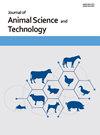Genome analysis of Lactococcus taiwanensis strain K_LL001 with potential cellulose degrading functions
IF 3.2
3区 农林科学
Q1 AGRICULTURE, DAIRY & ANIMAL SCIENCE
引用次数: 0
Abstract
具有纤维素降解功能的台湾乳球菌菌株K_LL001的基因组分析
<italic>台湾乳球菌</italic>starin K_LL001是从蚱蜢肠道中分离出来的(<italic>Oxya chinensis sinuosa</italic>)。在这项研究中,我们提出了<斜体>L的全基因组序列。台湾</italic>stain K_LL001。K_LL001基因组由1条环状染色体组成,不含质粒。全基因组长度为2018,259 bp,鸟嘌呤+胞嘧啶(G±C)含量(%)为38.75%,预测蛋白编码序列(CDS)为2021条。最丰富的CAZyme类<斜体>L。taiwanensis< / italic>菌株K_LL001为糖苷水解酶(GH)类。GHs是参与碳水化合物代谢的关键酶,它们催化纤维素、半纤维素和淀粉等复杂碳水化合物中糖苷键的水解。此外,& lt; italic> L。taiwanensis< / italic>菌株K_LL001具有编码酶的基因,可以催化一种糖苷转化为另一种糖苷。总的来说,本研究将有助于进一步理解< italit>L。在基因组水平上对菌株K_LL001进行研究,为其未来在养猪业中的应用提供理论依据。
本文章由计算机程序翻译,如有差异,请以英文原文为准。
求助全文
约1分钟内获得全文
求助全文
来源期刊

Journal of Animal Science and Technology
Agricultural and Biological Sciences-Food Science
CiteScore
4.50
自引率
8.70%
发文量
96
审稿时长
7 weeks
期刊介绍:
Journal of Animal Science and Technology (J. Anim. Sci. Technol. or JAST) is a peer-reviewed, open access journal publishing original research, review articles and notes in all fields of animal science.
Topics covered by the journal include: genetics and breeding, physiology, nutrition of monogastric animals, nutrition of ruminants, animal products (milk, meat, eggs and their by-products) and their processing, grasslands and roughages, livestock environment, animal biotechnology, animal behavior and welfare.
Articles generally report research involving beef cattle, dairy cattle, pigs, companion animals, goats, horses, and sheep. However, studies involving other farm animals, aquatic and wildlife species, and laboratory animal species that address fundamental questions related to livestock and companion animal biology will also be considered for publication.
The Journal of Animal Science and Technology (J. Anim. Technol. or JAST) has been the official journal of The Korean Society of Animal Science and Technology (KSAST) since 2000, formerly known as The Korean Journal of Animal Sciences (launched in 1956).
 求助内容:
求助内容: 应助结果提醒方式:
应助结果提醒方式:


